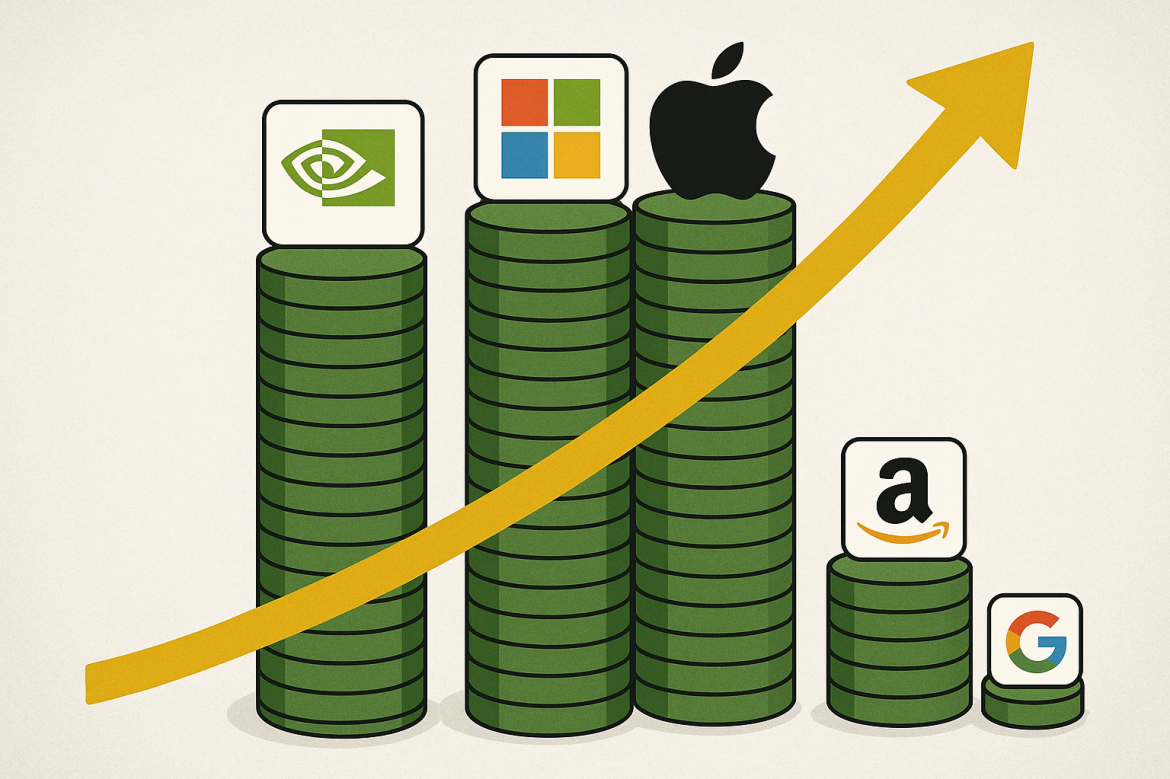
The $4 trillion club: how Nvidia, Microsoft, and Apple are rewriting capitalism
The balance of global corporate power has entered a new age.
For the first time in history, three companies, Nvidia, Microsoft, and Apple, each hover around or beyond the $4 trillion valuation mark, a milestone that redefines not only scale but the very mechanics of value creation.
These companies are no longer merely leaders in their sectors; they are the scaffolding of the digital economy.
Their technologies power global data flows, underwrite automation, and increasingly shape how humans work, think, and connect.
Together, they stand at the centre of a transformation where artificial intelligence and cloud computing form the infrastructure of modern capitalism.
The ascent of this trio marks a fundamental realignment in global markets, one driven less by industrial might and more by computational power.
Each has translated technological dominance into structural control over the world’s digital systems, and in doing so, has redrawn the boundaries of corporate influence.
Nvidia dominates the trillion dollar hierarchy
Nvidia Corporation, worth about $4.72 trillion, sits at the top of the global corporate hierarchy.
Its chips are the backbone of the AI revolution, powering data centres, supercomputers, and machine learning models across industries.
The company’s new H200 and Blackwell GPUs have been rapidly adopted by cloud leaders such as Amazon Web Services, Google Cloud, and Microsoft Azure.
Over the past year, Nvidia’s shares have surged more than 37%, reflecting near-universal demand for its hardware as AI adoption accelerates.
Once a niche gaming chipmaker, Nvidia now provides the essential infrastructure for computing itself, a position comparable to what oil producers represented in the industrial era.
Microsoft strengthens its hold on artificial intelligence
Microsoft, valued at around $4.05 trillion, has deepened its dominance through a landmark deal with OpenAI.
The agreement grants the tech giant a 27% stake worth $135 billion and access to OpenAI’s most advanced models until 2032.
OpenAI, in turn, has committed $250 billion in spending on Microsoft’s Azure cloud platform, ensuring sustained growth for one of Microsoft’s fastest-expanding business segments.
The partnership allows OpenAI to operate as a for-profit entity under the oversight of its nonprofit foundation, ending months of uncertainty over its structure.
Within Microsoft, AI is already transforming operations.
The company estimates that as much as 30% of certain coding projects are now completed by AI tools, saving over $500 million annually in customer service costs and driving productivity across its platforms.
Apple hit $4 trillion milestone briefly
Apple Inc’s shares briefly joined the $4 trillion club on Tuesday, becoming only the third company in history to achieve the feat.
Its shares have surged 56% since April, adding $1.4 trillion in value, propelled by booming demand for the iPhone 17, which outsold its predecessor by 14% in the first 10 days of release in the US and China.
The company has also refreshed its hardware portfolio with new iPads, MacBook Pros, and the Vision Pro headset featuring the powerful M5 chip.
Experts say these launches mark the beginning of a long-anticipated upgrade cycle, reflecting Apple’s continued mastery of product timing and ecosystem design.
Alphabet and Amazon expand through restructuring and automation
Alphabet remains the fourth most valuable company with a market value of about $3.24 trillion, and remains a core driver of the digital economy through its dominance in search, digital advertising, and artificial intelligence.
Its Gemini AI model and DeepMind division continue to pioneer breakthroughs in generative AI and scientific computing.
The company’s strong performance in cloud services and YouTube advertising has propelled it into the $3 trillion tier, reinforcing its role as a diversified tech powerhouse.
Amazon, valued at $2.42 trillion, is undergoing one of its largest structural transformations to date.
The company announced plans to eliminate roughly 14,000 corporate jobs, representing around 4% of its white collar workforce, as it accelerates the integration of AI across logistics, payments, and cloud operations.
Chief Executive Andy Jassy has described the cuts as part of a broader effort to “reduce bureaucracy” and redeploy resources towards automation.
While painful in the short term, the move positions Amazon to maintain leaner operations and drive long term efficiency.
Its cloud arm, Amazon Web Services, remains its main growth engine, supporting both AI and enterprise infrastructure worldwide.
The algorithmic economy emerges
Together, the top five companies, Nvidia, Microsoft, Apple, Alphabet, and Amazon, now represent more than $18 trillion in combined market value, exceeding the GDP of most countries.
Their rise marks the dawn of a new economic order in which computational power and digital infrastructure outweigh traditional measures of capital.
The $4 trillion club symbolizes more than financial achievement.
It represents the shift from an industrial world built on machinery to an algorithmic one powered by intelligence.
The post The $4 trillion club: how Nvidia, Microsoft, and Apple are rewriting capitalism appeared first on Invezz
